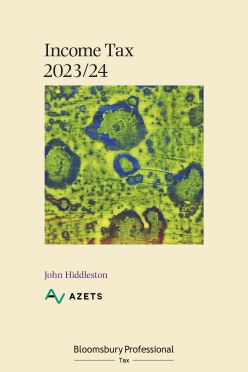Bloomsbury Professional Home
Tax
Q&A with John Hiddleston
John Hiddleston is the author of Income Tax Annuals.
You can receive online access to this through our Bronze Tax Service, Silver Tax Service, Gold Tax Service and Platinum Tax Service.
Can you tell us a bit about your background and areas of expertise?
I have been a technical tax consultant for many years now. I have done a wide variety of tax work – for example I was once the UK Tax Manager working in-house for a quoted multinational group of companies. Yet these days I’m regarded as a specialist in private client tax issues.
I have held senior roles in the tax technical departments of Top 20 accountancy firms. I am a member of the National Tax Office at Azets. In the past I was Head of Tax Technical at Vantis and, before that, National Director of Tax Technical at Horwath Clark Whitehill (Crowe UK).
How long have you been in this area and how has it changed?
I began working in tax in central London in the early to mid-1980s at Hays Allen (Haysmacintyre). I remember we were just beginning to use computers, and in those days the Revenue were called the “Inland Revenue”. The entire UK tax code fitted into just one or at most two books of legislation – tiny compared to today. The Revenue routinely issued “estimated assessments”, which we routinely appealed against on behalf our clients. There were “delay hearings” down at the commissioners. Yet curiously it all boils down to much the same in the end. In some ways tax work that hasn’t really changed that much at all.
What are some of the current trends in your area?
The Automatic Exchange of Information legislation and regulations (re US FATCA and OECD Common Reporting Standard) are complex but extremely important. They are too easily overlooked.
And the most important recent updates?
More and more commerce takes place through the internet. New rules from the OECD require digital platform operators (such as Air BnB and Uber) to report details of sellers using their sites to the tax authority where the platform is resident. Whilst first reporting in the UK isn’t until 31 January 2025, those affected should be tracking the information from 1 January 2024 and they really won’t want to be having to try and reverse engineer the information afterwards.
What would you say are the major challenges for the industry at the moment and why?
HMRC say they are struggling with a lack of resources. That puts additional pressure on our clients and therefore on us as their tax agents and tax advisers.
An increasing amount is being written about the application of AI in tax work – what are your thoughts?
In my university days I was fortunate enough to catch a fleeting glimpse of a – now departed - world-famous physicist with a giant intellect who is said to have been terrified about the prospects for humankind because of AI. Happily for me, I’ve no idea whether it’s a problem or not!

